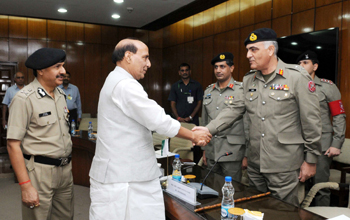INDIAN ARMED FORCES CHIEFS ON
OUR RELENTLESS AND FOCUSED PUBLISHING EFFORTS

SP Guide Publications puts forth a well compiled articulation of issues, pursuits and accomplishments of the Indian Army, over the years

I am confident that SP Guide Publications would continue to inform, inspire and influence.

My compliments to SP Guide Publications for informative and credible reportage on contemporary aerospace issues over the past six decades.
- Interim Defence Budget 2024-25 — An Analysis
- Union Defence budget 2024
- Indian Army: In quest of greater firepower and policy recommendations for gaps
- Indian Army Annual Press Conference 2024
- 6G will transform military-industrial applications
- Tata Boeing Aerospace Delivers 250 AH-64 Apache Fuselages, Manufactured in India
Border Protoclols — can they be effective
 |
By Lt. General P.C. Katoch Former Director General of Information Systems, Indian Army |

A delegation led by the Director General, Pakistan Rangers, Maj. Gen. Umar Farooq Burki calling on the Union Home Minister, Shri Rajnath Singh, in New Delhi on September 11, 2015. The Director General, BSF, Shri D.K. Pathak is also seen
After the aborted NSA level India-Pakistan talks, the three day Director General talks between the Border Security Force and Pakistani Rangers did finally go through. The Pakistani delegation was led by DG (Punjab) Maj Gen Umar Farooq Burki and the Indian side was headed by DG BSF DK Pathak. There was resolve to end the ceasefire violations as the DG-level dialogue got underway by evolving new border protocols albeit Pakistan continued to violate the ceasefire by resorting to cross-border firing. The two-day dialogue was extended by one day due to what media described as to discuss and finalize these new protocols and strategies. The discussions were wide ranging covering issues including putting in place a mechanism for coordinated patrolling and holding sector, battalion and post level talks on border issues. Media reported that the most significant aspect of the dialogue was that the two sides agreed that maintenance of peace and tranquility on the border is the most important issue and this needs to be implemented on the ground. The Pakistani side asked the BSF to initiate joint patrolling along some mutually identified areas. Towards end of the dialogue, the two sides signed a record of the discussions. The two sides agreed to jointly resolve sensitive issues like ceasefire violations and infiltration along the border by initiating timely exchange of information, emphasizing on the security and well being of border population on both sides. A decision was taken to initiate new CBMs by having regular exchange of sporting and cultural troupes in addition to initiating coordinated patrolling along specific border areas. The two sides also reportedly agreed to stop ceasefire violations along the IB through enhanced communications using multiple modes at all levels. The talks ended on the optimistic note with both sides agreeing on sustained endeavours to maintain peaceful and tranquil borders. The next round of the DG-level talks is to be held in Pakistan in first half of 2016. A Pakistan government statement described the talks having been held in peaceful, cordial and congenial atmosphere, adding, "The meeting took up specific issues of concern. Incidents of firing at the borders, smuggling of narcotics, infiltration attempts and defence construction activities were discussed. The issue of inadvertent crossing over by border populations and how to facilitate their return on both sides was also discussed". The talks and the Pakistani statement no doubt were both good but the bottom-line is that leave aside the DG Rangers of Pakistan, even Prime Minister Nawaz Sharif is helpless against the all-powerful Pakistani Military which has no intention to shed its state policy of terror and proxy war against India. Besides that para-military forces in Pakistan are under command the military — Musharraf called the NLI his second line of defence during the Kargil conflict. Presently the Pakistani army is being accused in their own country in raiding political offices and establishments confirming the sham democracy. That Pakistan is a protégé of China and follows the same policy of her mentor has been display. So all the promises of maintain peace and tranquility on the borders remain paper exercises till there is actual resolve behind it. The fact that Pakistan willfully violated the ceasefire during the DG-level talks itself demonstrated she has no willingness to have peace with India. Same is in case of China who despite plenty pledges of peace and tranquility and not disturbing status quo has gone in to create a standoff in Depsang again by erecting a tower. It would not be surprising that this Chinese action coinciding with the DG-level talks here was to indicate support to rogue Pakistan. Pakistan also cannot desist from raising the nuclear bogey even when irrelevant. While the DG-level talks were ongoing, Pakistani paper Dawn published a report of Pakistan having assessed that India has enough missile material for more than 2000 warheads and that Pakistan's National Command Authority (NCA) has concluded that India's growing nuclear program and absence of a conflict mechanism were upsetting strategic stability in the region and the situation was forcing Pakistan to maintain 'full-spectrum deterrence capability'. Not only is all this irrelevant in face of India's 'No First Use' doctrine but it was perhaps to distract from the fastest growing nuclear arsenal of Pakistan, especially the tactical nuclear weapons (TNWs). Late Hamid Gul was famous for rattling the nuclear bogey repeatedly, a role now taken over by Raheel Sharif and Sartaj Aziz. The humorous part is that post the last such statement by Sartaj Aziz, Pakistani media interviewed a woman in Punjab, wherein her retort in native Punjabi translated as 'Here in Pakistan, we don't have water to wash our bottoms, and these fellows are talking of nuclear war with India'. That clip, viral on social media, should be seen by the Pakistani military — may be some wisdom may dawn.





